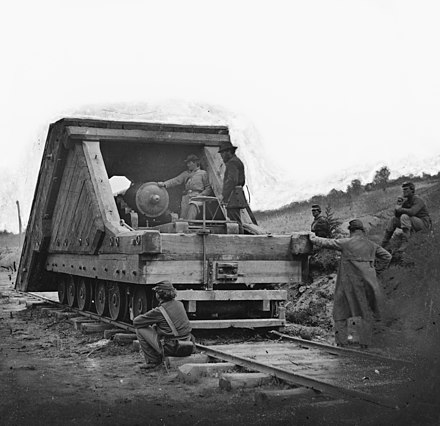Does that thing have a big turntable under there somewhere? Because from the photo, it looks like it can shoot in exactly or almost exactly the direction the rails happen to be pointing, and if you need to shoot somewhere more than two or three degrees to either side, you're SOL…
HistoryPorn
If you would like to become a mod in this community, kindly PM the mod.
Relive the Past in Jaw-Dropping Detail!
HistoryPorn is for photographs (or, if it can be found, film) of the past, recent or distant! Give us a little snapshot of history!
Rules
- Be respectful and inclusive.
- No harassment, hate speech, or trolling.
- Engage in constructive discussions.
- Share relevant content.
- Follow guidelines and moderators' instructions.
- Use appropriate language and tone.
- Report violations.
- Foster a continuous learning environment.
- No genocide or atrocity denialism.
Pictures of old artifacts and museum pieces should go to History Artifacts
Illustrations and paintings should go to History Drawings
Related Communities:
It doesn't look like it. They did sometimes use a kind of turntable to allow regular cannons to easily change direction, but I don't think the same was done with these.

Maybe it's because of the recoil?
Having the canon alligned with the track allows it to move with the recoil while having it slightly angled may make it derail 🤷♂️
I'm guessing it was used almost exclusively to destroy trains.
Siege of Petersburg, I believe, so trading fire between two relatively static lines.
We're huntin trains today, Billy.
Id expect it was intended to be operated on a curved section of tracks to allow it to aim and function as artillery. Similar concept as the https://en.m.wikipedia.org/wiki/Schwerer_Gustav
Back when a solid plank was all I took to protect you from rifle fire. Or does the encasing serve some other purpose, perhaps?
It also serves as a bike ramp. The Confederate soldiers were well known for their love of BMX tricks.
Wood still wasn't strong enough to sustain a lot of fire even from those rifles. The confederacy just didn't have enough iron.
That's some pretty thick wood at a good angle. Maybe there's a mythbusters, but I'd expect it could protect against small arms fire of the day.
Wood is definitely better than nothing, but I don't really see a situation in which this thing would need protection against small arms anyway. Unless something has already gone horribly wrong, those small arms are a significant distance from your artillery. At that range, they are already effectively worthless because their lack of rifling makes them horribly inaccurate.
If I had to guess, you would mainly be worried about union sharpshooters (maybe) and artillery. At that point the only real advantage of the wood is the obstruction of sight.
The standard rifled muskets of the time actually had a range of about a kilometer.
The fourth guy from the right looks so confident; oh yeah, you think you got what it takes? Bring it!
Plank stronk
Kinda looks like one of those turtle tanks (blyatmobiles) that are showing up now in the Russian-Ukrainian War.
